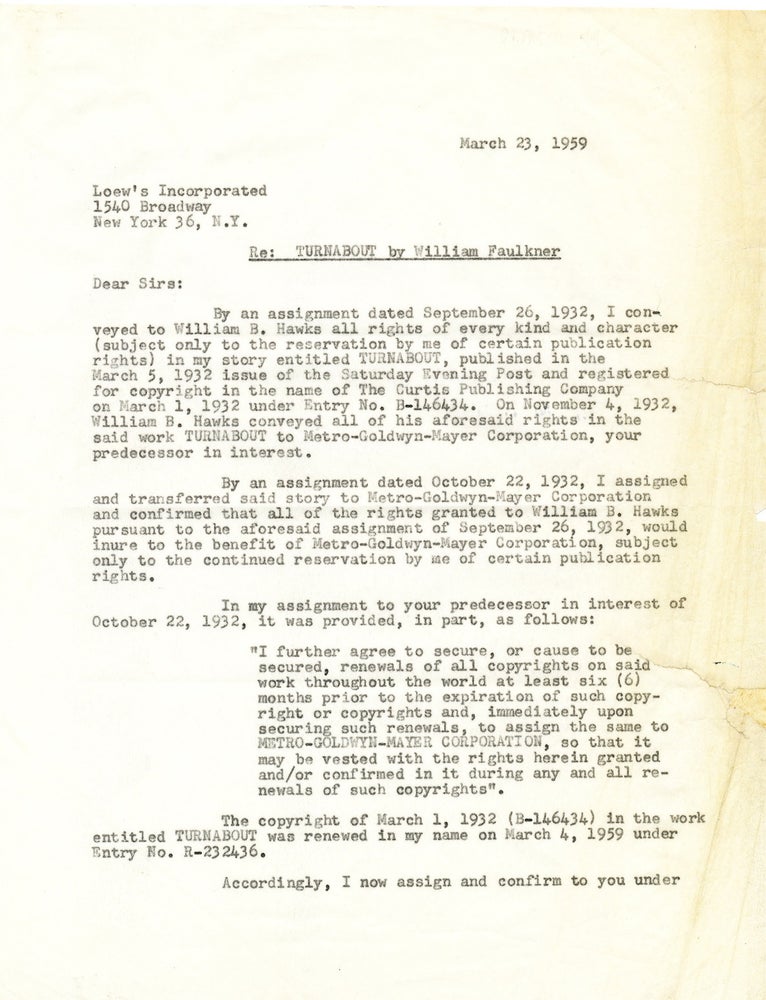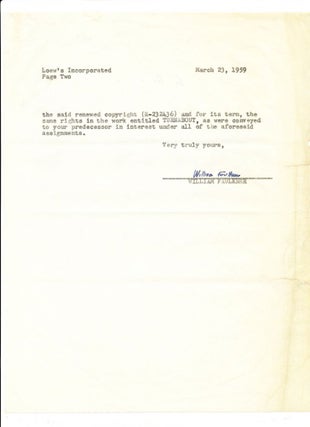WILLIAM FAULKNER
FAULKNER, WILLIAM. “Turnabout,” Film Contract for Distribution Rights
WILLIAM FAULKNER, Film Contract Signed for his first story-to-screen adaptation, “Turnabout,” two 4to pp, New York, March 23, 1959. Faulkner's signed contract transferred distribution rights for the film based on Faulkner’s story, “Turnabout” to the Loew’s Corporation. "By an assignment dated September 26, 1932, I conveyed to William B. Hawks all rights of every kind... in my story... TURNABOUT, published in the March 5, 1932 issue of the Saturday Evening Post and registered for copyright... On November 4, 1932, William B. Hawks conveyed all... rights... to Metro-Goldwyn-Mayer... your predecessor.... In my assignment... it was provided [that I]... secure... renewals of all copyrights...The copyright of March 1, 1932... was renewed in my name on March 4, 1959....Accordingly, I now assign and confirm to you... the same rights in the work entitled TURNABOUT...." Signed in full on the signature line, “William Faulkner.”.
The film referenced in our document is titled, “Today We Live,” released in 1933 by MGM. According to the Turner Classics Movies web site, this film is listed as being distributed by Loew’s which was the parent company of MGM from 1924-1959. The story is about an American World War I aviator who befriends a British torpedo boat pilot and comes to see the war from a different perspective. The film, considered a romance drama, was produced and directed by Howard Hawks and starred Joan Crawford, Gary Cooper, Robert Young and Franchot Tone. Faulkner provided dialogue for the film. Hawks purchased the option on the story, but Irving Thalberg, then Vice President of MGM, forced Hawks to hire Crawford for the film and forced Faulkner to write a love interest for the men. Crawford was under contract for MGM at the time.
All of this weakened Faulkner’s original story and thus the film’s plot. In addition, the film apparently included inappropriate use of non-period costumes and an unconvincing Crawford. “Today We Live” turned into a failure. According to a movie review in the “New York Times” on April 15, 1933 by Mordaunt Hall, this "first of William Faulkner’s literary efforts to reach the screen... is understood to have been amplified in the studio by the author... is at times vague and cumbersome. It possesses, however, the spark of sincerity.... “ Margin tears and stains show on right margins of both pages.
Faulkner is regarded as one of the most influential writers of the twentieth century and was awarded the 1949 Nobel Prize for Literature.
Item #4043
Price: $7,600.00

